Get inspired! Gather some ideas on how to celebrate and advocate for Lab Week using this handbook.
*Please follow local guidelines and prioritize your safety when planning any activities.

This National Medical Laboratory Week, we hope you enjoy the spotlight with your peers.
Every year, we ask major landmarks to light up in indigo to celebrate you. This year we want to shine that light on the work you do ensuring accurate diagnosis for both patients and other health care professionals. You are experts and key figures in every patient’s journey, and there is no doubt your work is essential for a well-functioning health care system.
Watch for more items to be added to the toolkit. Subscribe to eNEWS and follow us on Facebook, Instagram, LinkedIn, and Bluesky for updates.
Here are some of the landmarks that participated, and thank you to everyone who shared their photos with us.
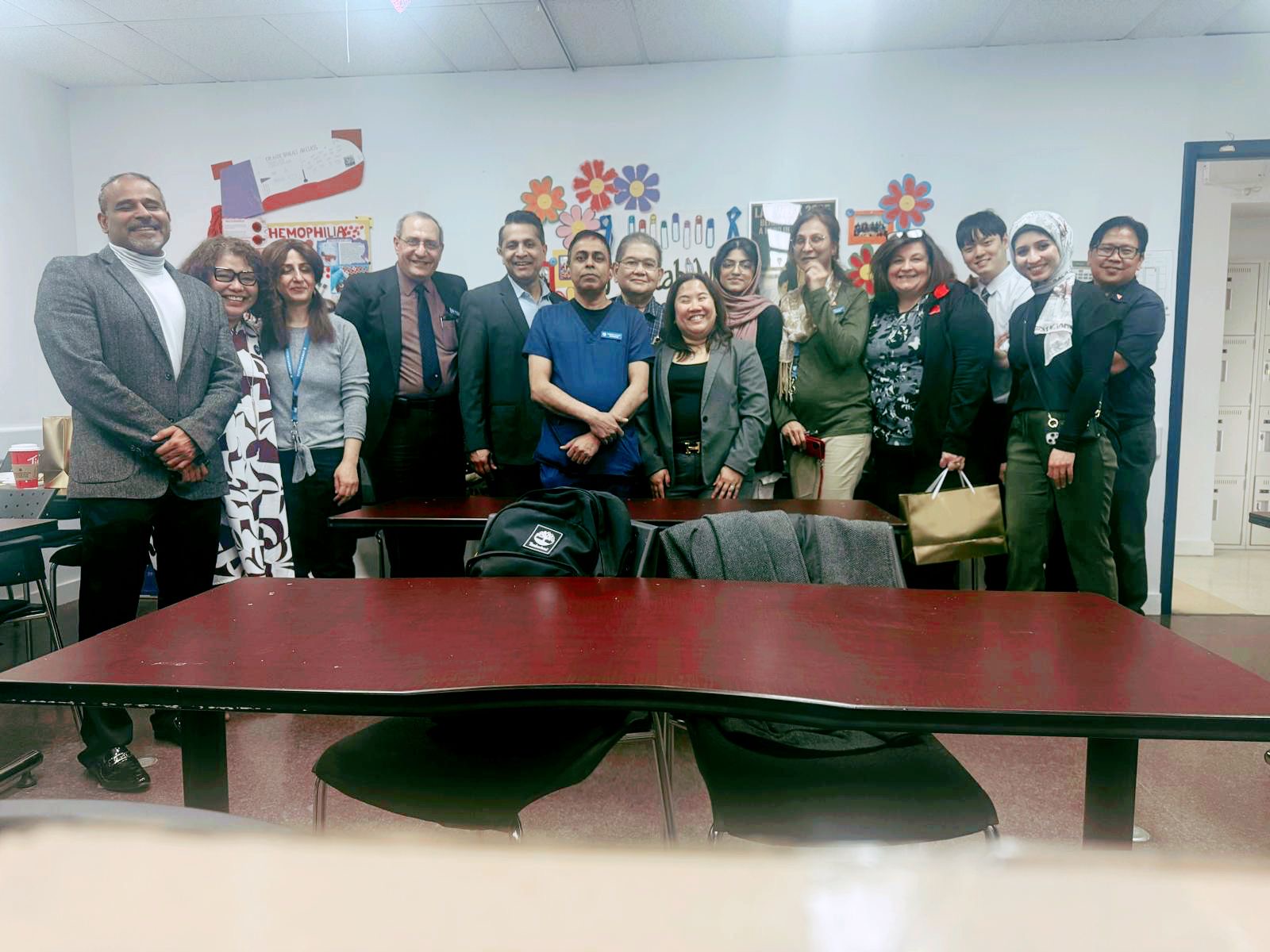
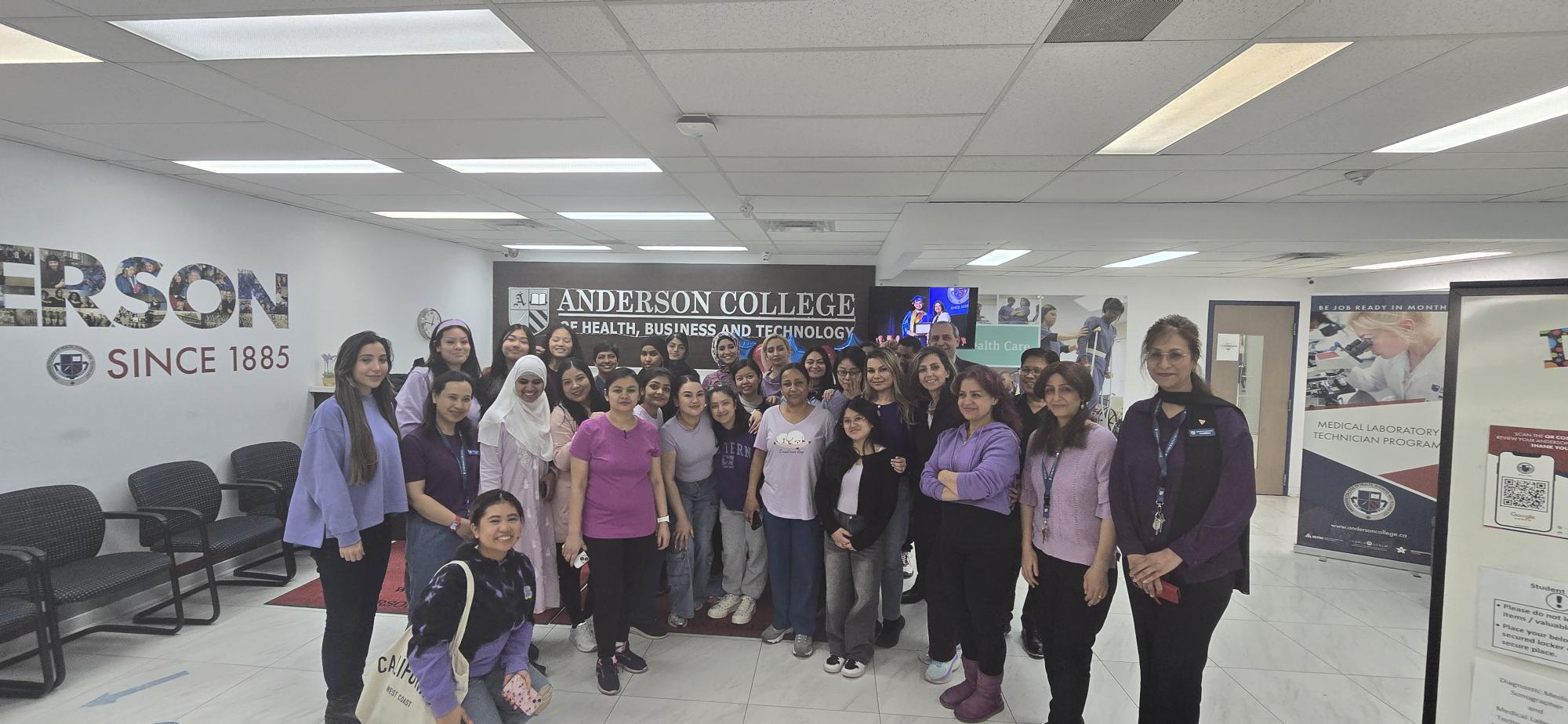
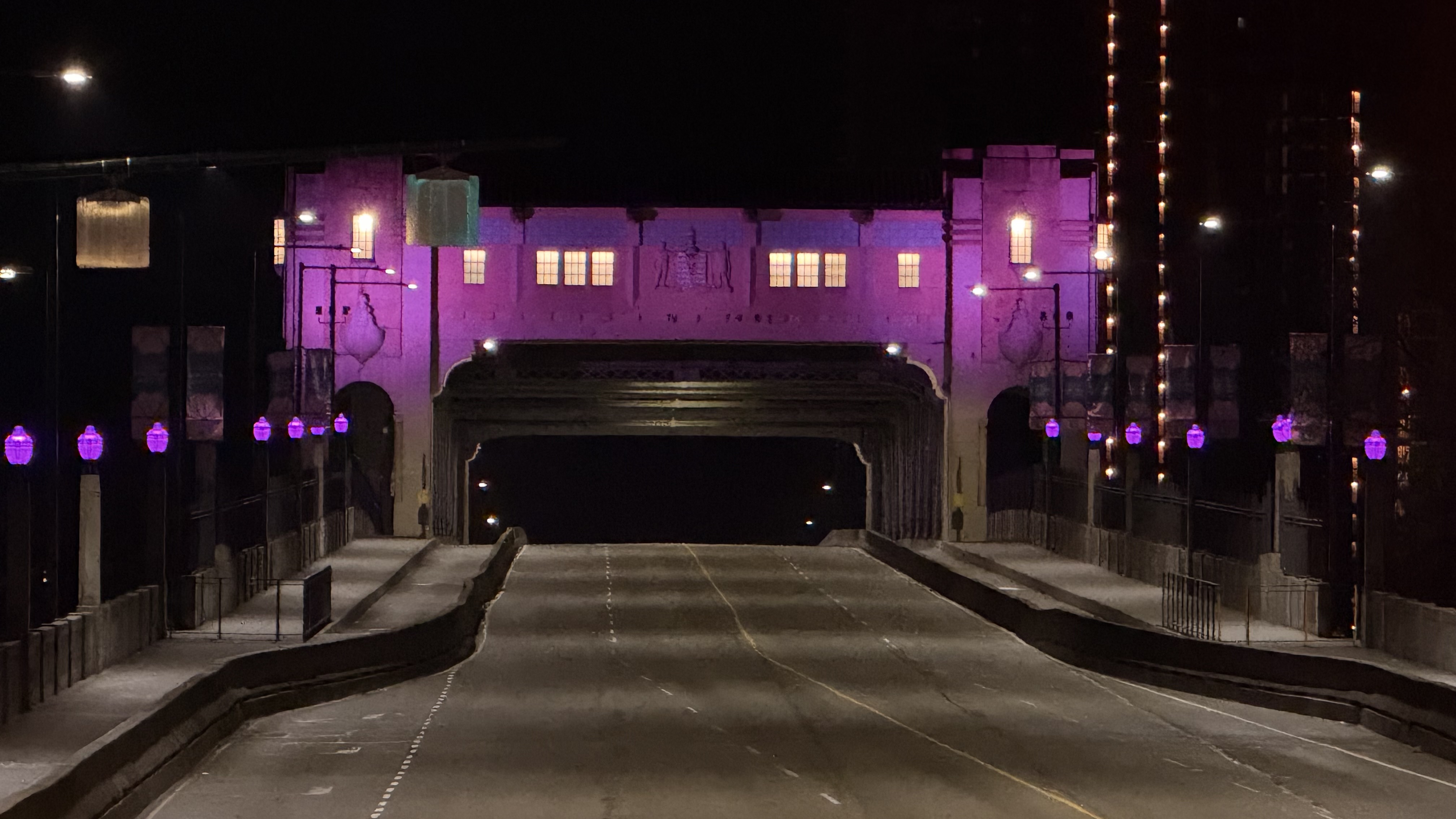


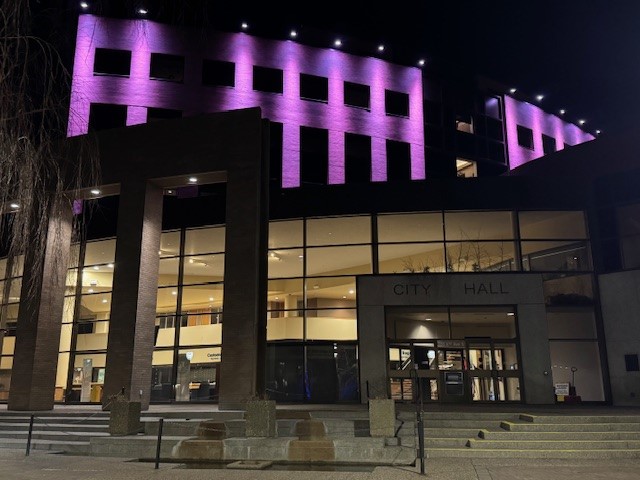
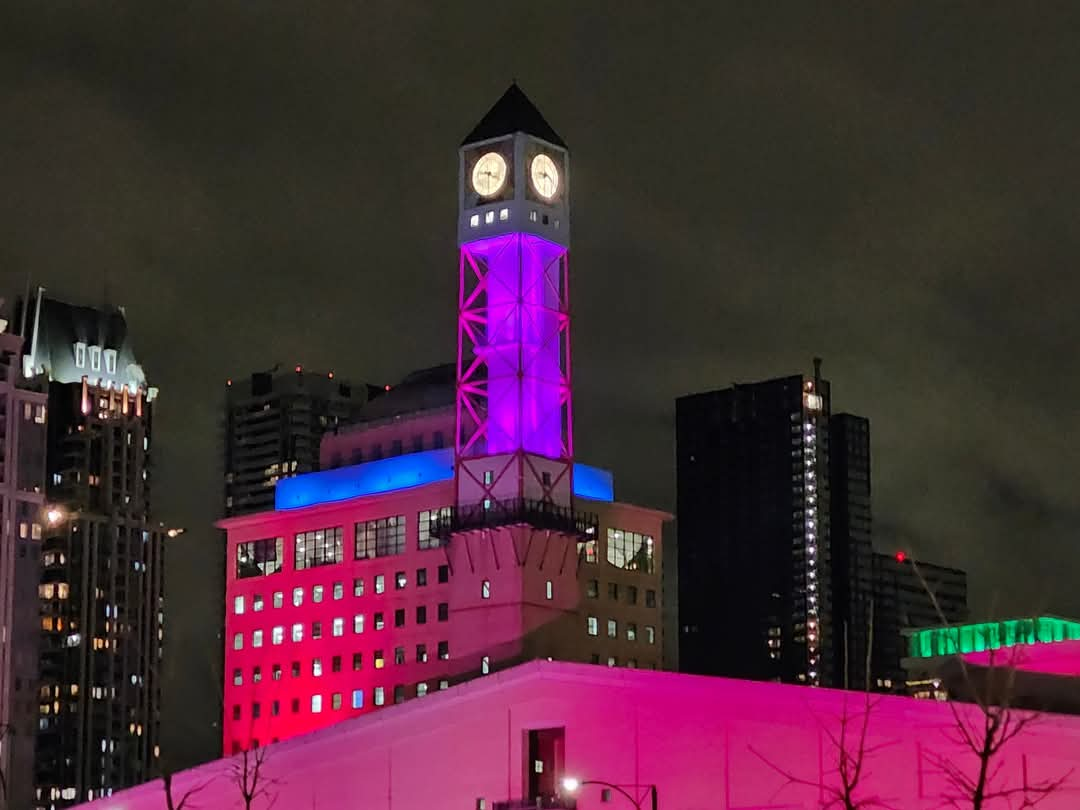
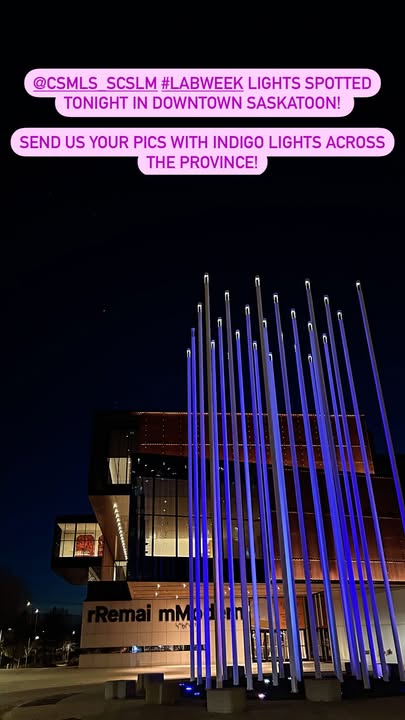
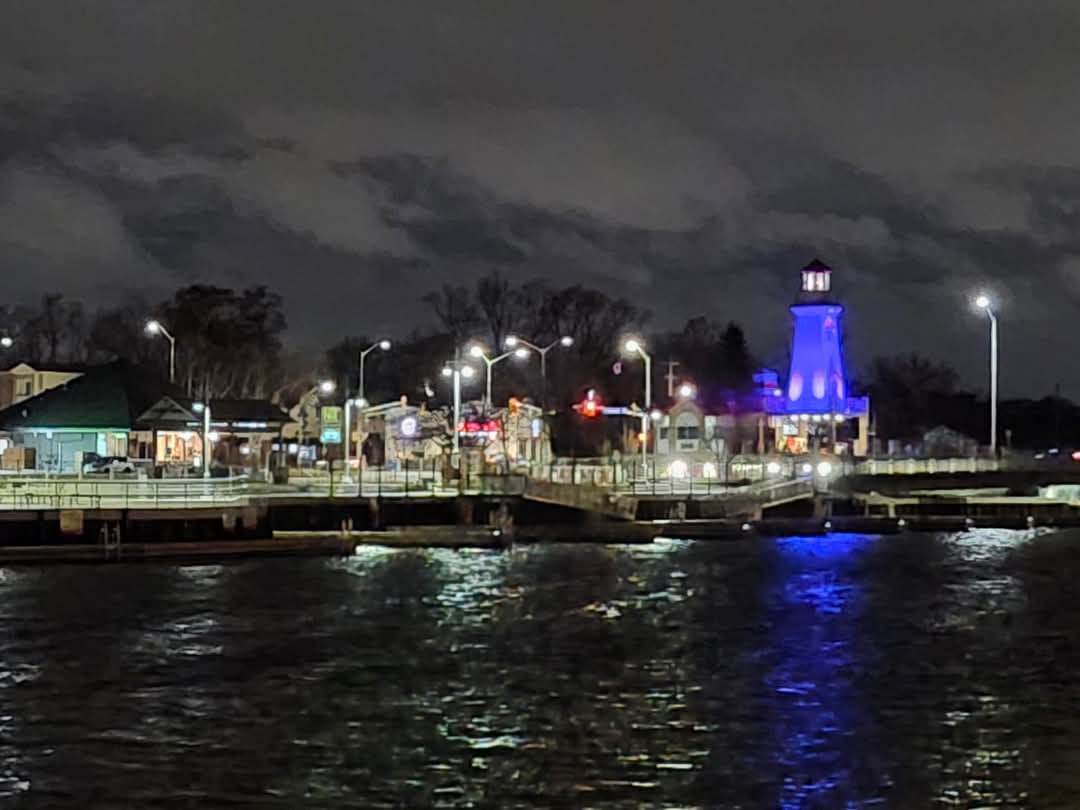
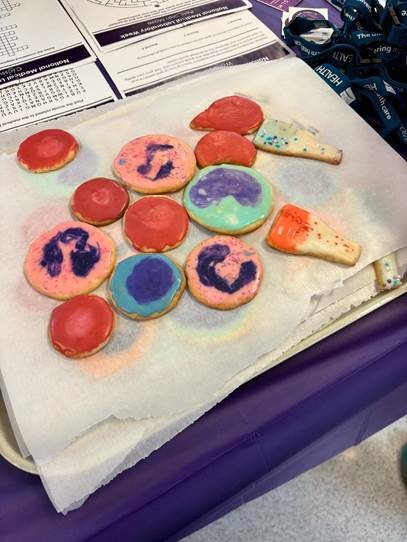
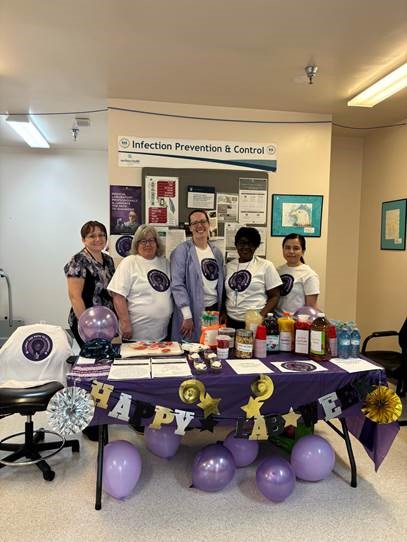
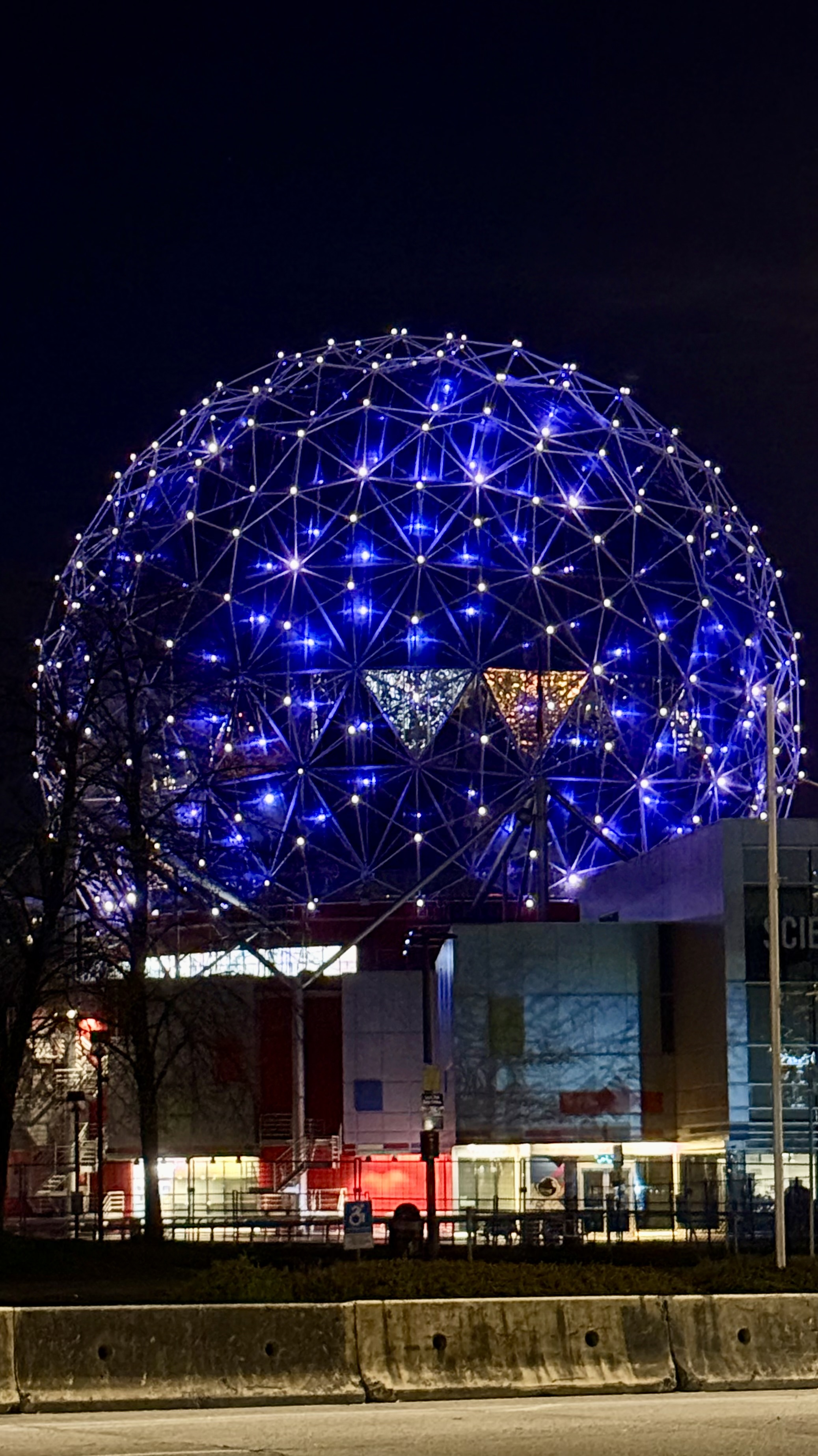


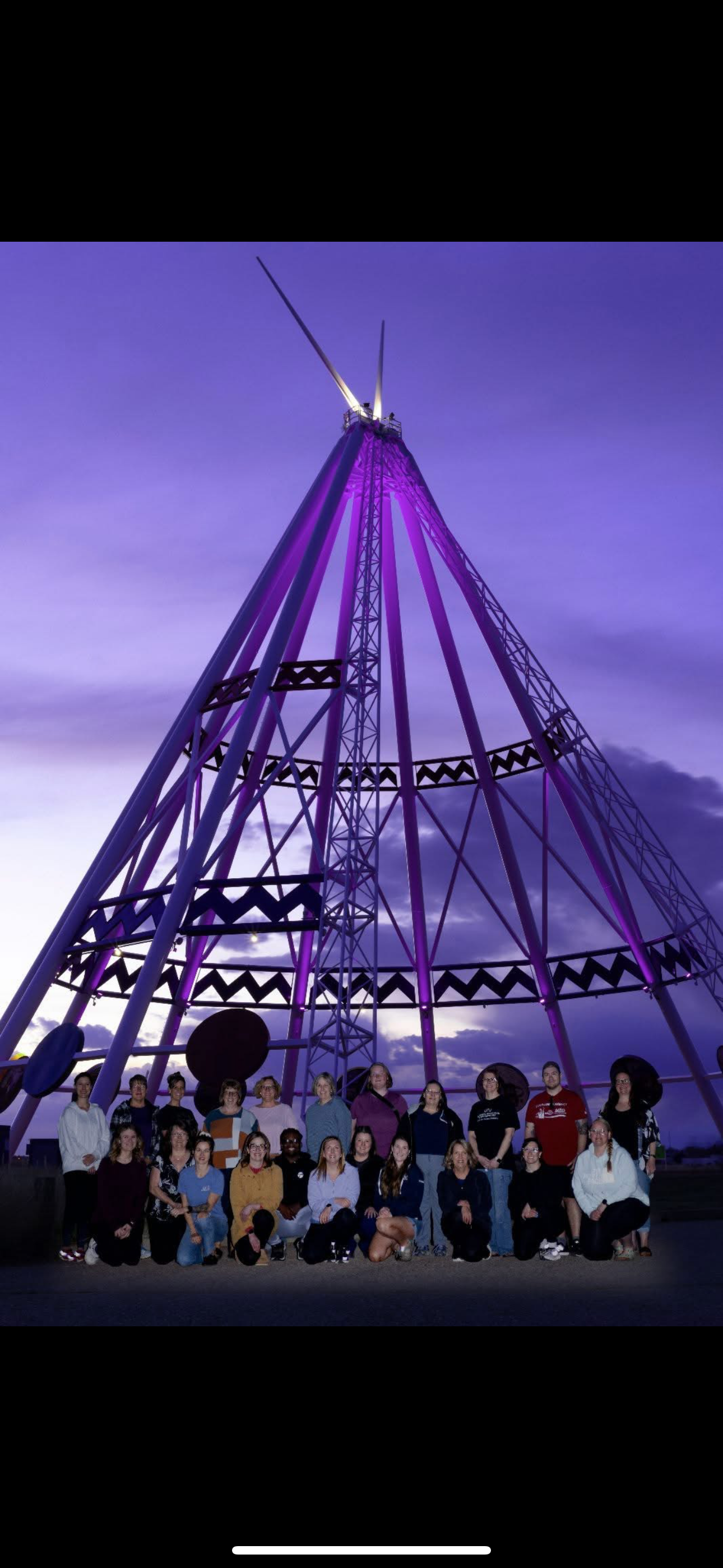
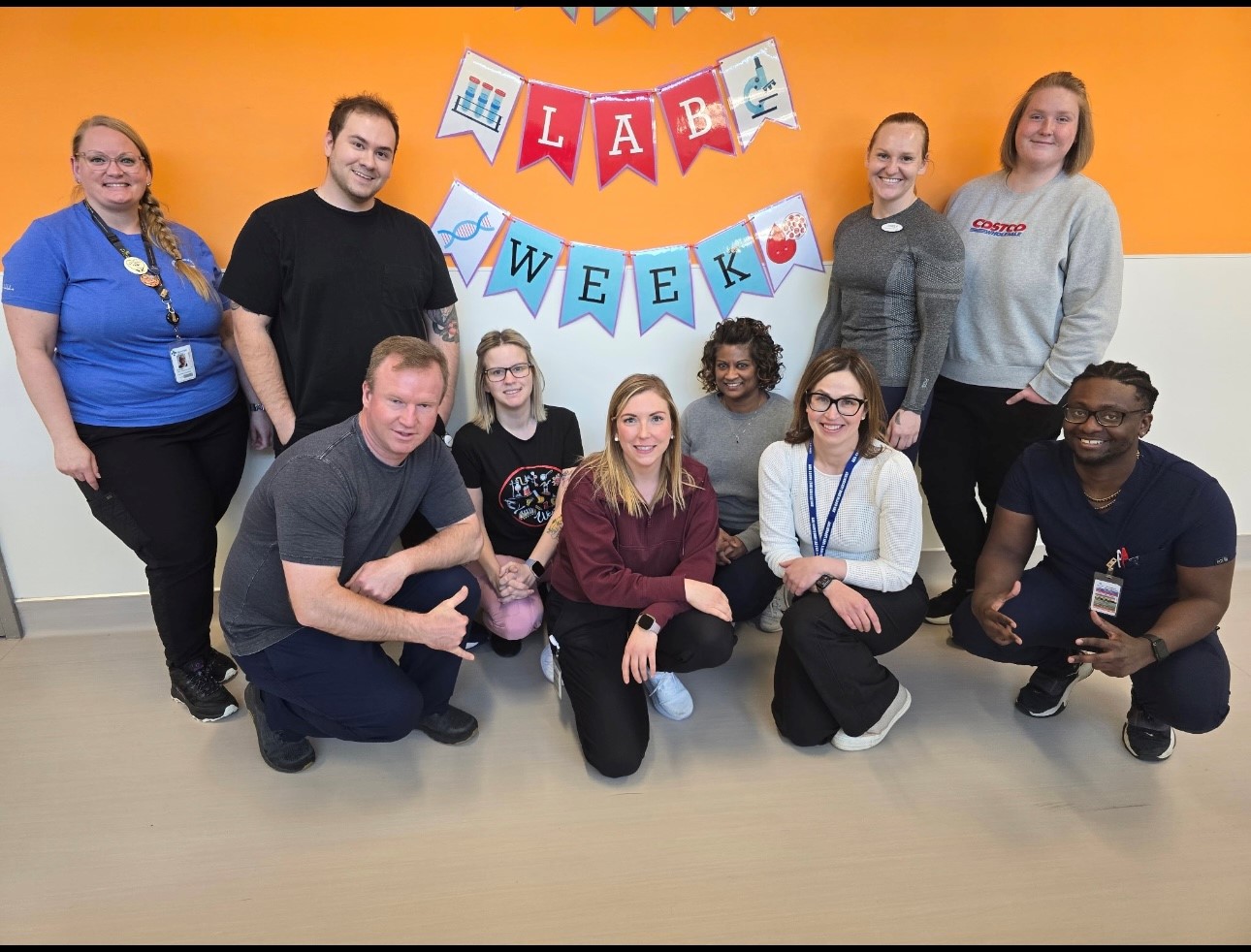
Take a look at this schedule for confirmed and pending 2025 light displays.
| Landmark | Where | When |
|---|---|---|
| SAIT Centennial Arti Installation | Calgary, AB | April 13 - 19 |
| Calgary Tower | Calgary, AB | April 15 |
| High Level Bridge | Edmonton, AB | April 15 |
| Centre 2000 Sundial | Grande Prairie, AB | April 13 - 19 |
| Lethbridge City Hall | Lethbridge, AB | April 13 |
| Saamis Tepee | Medicine Hat, AB | April 15 |
| Royal Inland Hospital Breezeway | Kamploops, BC | April 16 |
| Skywalk at Kelowna General Hospital | Kelowna, BC | April 15 |
| Port Coquitlam City Hall | Port Coquitlam, BC | April 15 |
| Burrard Street Bridge | Vancouver, BC | April 15 |
| Canada Place Sails of Light | Vancouver, BC | April 15 |
| Northern Lights Display at BC Place | Vancouver, BC | April 13 |
| Vancouver City Hall | Vancouver, BC | April 15 |
| Vancouver Convention Centre | Vancouver, BC | April 13 |
| Science Dome at Science World | Vancouver, BC | April 15 |
| Legislative Assembly of British Columbia locations: the Ceremonial Entrance, Front Fountain, Back Fountain of the Parliament buildings and the Confederation Garden Fountain and Waterfall | Victoria, BC | April 15 |
| Brandon Regional Health Centre | Brandon, MB | April 13 - 19 |
| Winnipeg City Sign | Winnipeg, MB | April 15 |
| Esplande Riel Bridge | Winnipeg, MB | April 15 |
| Promenade Waterfront Tower | Bathurst, NB | April 13 - 19 |
| The JK Irving Centre | Bouctouche, NB | April 13-19 |
| Fredericton City Hall | Fredericton, NB | April 14-27 |
| City of Moncton x 4 (City Hall, Downing Street, Downtown Place and the Avenir Centre) | Moncton, NB | April 15 |
| Riverview City Sign | Riverview, NB | April 15 |
| St. John's Convention Centre | St. John's, NL | April 13 - 19 |
| Province House, Nova Scotia Legislature | Halifax, NS | April 14 - 18 |
| Bluenose II | Halifax, NS | April 15 |
| New Glasgow Town Hall | New Glasgow, NS | April 13 - 19 |
| The Big Fiddle | Sydney, NS | April 15 |
| Bridge Street Bridge | Belleville, ON | April 14 - 20 |
| Brant Street Pier | Burlington, ON | April 15 |
| Eganville City Sign | Eganville, ON | April 13 - 19 |
| CSMLS | Hamilton, ON | April 13 - 19 |
| Hamilton City Sign | Hamilton, ON | April 15 |
| City Hall and Springer Market Square | Kingston, ON | April 15 |
| Civic Centre Clock Tower | Mississauga, ON | April 15 |
| Niagara Falls | Niagara Falls, ON | April 15 |
| Anderson College, North York Campus | North York, ON | April 13-19 |
| Rogers Centre Ottawa | Ottawa, ON | April 18 |
| Port Credit Lighthouse | Port Credit, ON | April 15 |
| Sarnia City Hall | Sarnia, ON | April 14 - 19 |
| Big Nickel | Sudbury, ON | April 15 |
| Timmins McIntyre Headframe | Timmins, ON | April 14 - 21 |
| 3D Toronto Sign, Nathan Phillips Square | Toronto, ON | April 15 |
| CN Tower | Toronto, ON | April 15 |
| la Tour de Montréal du Stade Olympique | Montreal, QC | April 15 |
| Prairie Wind Monument (Remai Modern Art) | Saskatoon, SK | April 13 - 19 |
| River Landing Towers | Saskatoon, SK | April 13 - 19 |
| Sasktel Centre | Saskatoon, SK | April 15 |
| Jim Smith Building | Whitehorse, YT | April 13 - 19 |
My coworker's names are the Medical Laboratory Programs Team. They work in both the Medical Laboratory Science and Medical Laboratory Assistant/Technician Programs as Faculty and Support Staff, guiding and mentoring students at St. Lawrence College.
All of us are proud graduates of the St. Lawrence College (SLC) Medical Laboratory Science Program and returned to share our love for the profession. Our passion for science and problem-solving and the critical role lab testing plays in patient care led us to this field, and now we have the privilege of passing that knowledge and enthusiasm on to our students.
In our roles as Faculty and Support Staff, we are dedicated to educating and shaping future laboratory professionals. Whether teaching theory, guiding hands-on skills, or providing essential program support, each of us plays a key part in preparing students for successful careers in the lab.
Some of our proudest moments come from seeing students grow in confidence and skill—whether it's their first successful blood draw, mastering a complex technique, or securing their first job in the field. Watching graduates go on to make a difference in patient care reaffirms why we do this work. Their successes and passion for the profession inspire us to continue mentoring and guiding the next generation of medical laboratory professionals.
- By Tara Dawe
I became an MLT because I was interested in science and in being able to help people, but I was not interested in being a primary care provider.
I am currently the senior technologist covering Microbiology, POCT and referred-out testing. I cover bench work, do document updates, and I am a technical specialist.
I am always happy to be able to give the physician that little piece of information that makes the break through, and they can finally get the full picture and diagnose the patient. I am also proud of being able to speak with the physician and explain to them what I am finding and what I think may help them figure out what is going on. That they have the confidence in me to take my suggestion and thank me for my help makes me very happy. I am lucky enough to work in a small enough (mid-size) hospital that we have a good relationship with the physicians and the nursing staff, and we have a really great inter-professional relationship.
If there are WBC flags on the analyzer and I need to look at a slide, I am the potentially the first person to know that the patient has a serious diagnosis. Making the call to the physician and nursing staff that is about to completely change a person's life is both an honour and something that remains difficult no matter how many years I have been in the lab. I am always full of questions and searching for the answers; there is nothing better than that AHA moment and being able to say why the patient is sick. The sense of accomplishment and knowing that I helped is why I come to work every day.
My family has a heritage in the medical profession dating back to the mid-1700s in Scotland. I wanted to help people get better sooner by helping doctors obtain proper diagnoses and treatments.
My role in the lab was to develop the first Molecular Microbiology tests to come online and be used in the lab.
Some of my proudest moments were developing a one-day turn around time test for Herpes encephalitis in order to obtain rapid treatment and save lives. I also developed a one-day turn around test for influenza, which saved the lives of those living in long-term care by them receiving antiviral treatment sooner and preventing secondary pneumonia, which may cause death.
My work illuminated the path to diagnosis when another lab worker took my influenza method and expanded it to include all respiratory viruses, including RSV, to save more lives.
Growing up, I was really fascinated by science and technology. When my eyes laid open to the opportunities inherent in this world, I somehow obtained an unsatisfiable curiosity with the laboratory; whether it was research or clinical. The performance of sophisticated methodologies that require mental resilience and scientific background were the major inputs in my pursuit of this profession.
I work as a bench medical laboratory technologist in the core laboratory of our institution.
One of my proudest moments was to adapt to the Canadian health care system in a timely manner, which I can assure you, is a difficult path that I took since I am an internationally-educated and internationally-trained medical laboratory technologist. I am also proud of telling the public, when inquired, what we do inside the laboratory. It is also good to mention that I also guide the other members of the health care profession by giving them the right information following the institution's policy. I also want to highlight all the things that medical laboratory assistants do; in my opinion, they are angels on Earth. I love all aspects of Pathology and Laboratory Medicine; the thought of going to work to do a peripheral blood morphology on CellaVision, and group and screen in transfusion medicine is enough to keep me going. In short, resilience, collaborative practice, advocacy and testing methodologies are the factors that made my continuous devotion to this profession.
Our responsibility and significance as a part of the diagnostic team cannot be overstressed. Our strict adherence to evidence-based standards maintains the patient's safety as well as ours. The quality assurance system makes accuracy and precision in place. Our educational background and experience improve our judgment skills.
Very precise, very demure, that's laboratory professionals for you!
I first became a lab tech because I wanted to help people. I am a Histology Technologist working in my field for 17 years. My proudest moments are being part of a great professional team that helps so many people get a diagnosis. Also, I have been fortunate enough to work with amazing people during my career who make the work fun. I always think of the patient first, and that helps me to do my best work every day and try to continually improve. That keeps me passionate about the job we do, and I love to share that with my coworkers and when I train new staff.
My name is Leesa Lillie. I decided to become a medical lab professional because I wanted to help people in my community. I work as a Medical Laboratory Technologist at Halton Healthcare. I illuminate the path to accurate diagnosis by testing and detecting illnesses in blood, urine, and other body fluids.
My name is Mona El Wanni.
I decided to become a medical lab professional because I have always been passionate about healthcare and laboratory science. I find it fascinating how laboratory results can significantly impact patient care and treatment outcomes.
I work as a Laboratory Professional at LHSC in the Emergency Department. I illuminate the path to accurate diagnosis by performing laboratory tests, analyzing results, and providing critical information to healthcare professionals to inform patient care decisions.
Why you decided to become a medical lab professional?
This is not your conventional story, but a single stranger I met one night inspired me to pursue the medical laboratory profession. From a distance, I saw a man hobbling around on crutches, and I felt so sorry for him. I also noticed he was by himself. I approached him and asked if he would be my partner for a game of cornhole. While conversing with him, he informed me of his terminal cancer diagnosis. After my heart dropped, he told me he had come out for one more night because he knew he did not have much time left to live. He informed me of his own accomplishments as a worker and researcher in the medical laboratory profession. His charisma stuck to me like glue and that night, I knew the laboratory profession would also be what I would pursue.
What is your specific role in your lab?
My specific role is performing phlebotomy on men and spinning blood in order to get that PSA tested! I am a Medical Laboratory Assistant currently for the Prostate Cancer Centre. Having many uncles diagnosed with this type of cancer in my family motivated me more than ever to be a part of the process in saving lives. I also have previous experience performing urinalysis in a chemistry department.
What are some of your proudest moments that inspire you to continue doing this work?
I have attended many Indigenous community clinics. Their strong sense of community and commitment to each other and people like me has inspired me to advocate for equitable healthcare, as they touched my heart on many levels. Their gratitude never goes unnoticed. They continuously welcome the Man Van (a department of the Prostate Cancer Centre) with open arms and provide us with food, comfort, and companionship. I would like to thank the Indigenous communities for making a positive impact in my life.
How is your work illuminating the path to accurate diagnosis?
I am fortunate to have worked in various roles which exposed me to challenging experiences, continuing education, and magnificent mentors. I submitted a research essay under the CAMRT of Canada and am planning to present a proposal at LABCONIC, which both consist of my efforts to promote accurate diagnosis. I could not have done this without the people who educated me throughout my life and my mentors.
Hey! I'm Kiana Beers, an MLT in the Biochemistry Laboratory at The Moncton City Hospital in New Brunswick. I always knew I wanted to work in Health Care from a young age, but I knew that direct patient care wasn't really my vibe... So, I went to a career fair in High School when I was still trying to figure out how to get to my end goal; that's when I found the MLT course at NBCC. It was perfect!
Through this avenue, I was able to get my certification as a Medical Laboratory Technologist. I then joined the team of Allied Health Care Professionals. It is my specific role to run Clinical Chemistry tests such as Blood Gasses, Urinalysis, Electrolytes, Enzymes, Hormones, Therapeutic Drugs, Drugs of Abuse, and a plethora of other Assays. I take pride and inspiration in knowing that although I am not praised or glorified by the general public whose lives I affect, the work I am responsible for doing is for the good of the community at large.
This is a noble profession, and it brings me pride to be a part of a society such as CSMLS. All of us want the best outcome for all of our patients, and the LEAST we can do for them is our best - which is continuing to deliver quality results in a timely manner!
I would like to introduce my coworker, Jasleen Minhas. Her leadership and intelligence have contributed to the successful processing and procurement of patient specimens. She offers unconditional support, creates a positive learning environment, and looks out for everyone’s safety, so much so that 2024 was a record-breaking year, having tested 10,203 men.
1. Why did you decide to become a medical lab professional?
I wanted to help people, to help physicians treat illnesses.
2. What is your specific role in your lab?
Histopathology technologist, clinical educator
3. What are some of your proudest moments that inspire you to continue doing this work?
When I assist a pathologist with cryostat sectioning, my work allows them to give results to the surgeon, in order to help the patient directly in the operating room. Also, to see my previous students work with me as colleagues, and to see them perform professionally and extraordinarily.
4. What are some of your proudest moments that inspire you to continue doing this work?
By producing quality slides, the pathologist is able to provide a clear diagnosis to the attending physician.
• Why did you decide to become a medical lab professional?
I have always been fascinated by science, especially as it applies to the medical world. I have always wanted to work in the lab, and becoming a medical lab professional allows me to make a difference in people's lives in the form of early cancer detection as well as providing a key diagnostic tool for improved patient care.
• What is your specific role in your lab?
As a cytologist, my main specific role is to screen and detect any abnormalities in a specimen, especially when it comes to pre-cancerous and cancerous cellular changes. That said, not all tumors are cancerous, and it is not always about cancer – there are certain conditions or infections that can be detected cytologically as well. Another specific role of mine is to assist with fine needle aspiration biopsies.
• What are some of your proudest moments that inspire you to continue doing this work?
I find my contribution toward providing the best possible care for every patient – especially in the fight against cancer- to be very rewarding. This, in turn, inspires and motivates me to keep up the good fight against a worthy cause.
My proudest moment was when I was named an ASCP Forty Under 40 by the American Society for Clinical Pathology. This subsequently led to another proud moment when I was featured by CSMLS in the Canadian Journal of Medical Laboratory Science (CJMLS), and I am very honored to have received this national recognition.
In 2021, I received an email from the CSMLS nominating committee informing me that my name had been put forward as a potential candidate for the Board of Directors for the BC region. I believe the two recognitions played a role in my nomination.
Other proud moments were my involvement on a national level with the CSMLS. These are the CSMLS projects I have had the pleasure of being involved with:
Sadly, cancer is the number one cause of death in Canada. Early detection is therefore very important, and it goes without saying that an accurate diagnosis is crucial for the patients to have the best possible treatments. My work illuminates the path to accurate diagnosis because of my contribution to the final diagnosis by examining and marking the slides, followed by giving my interpretation of the case.
I am also grateful for the opportunities that have allowed me to raise awareness of my work and to advocate for the profession at the same time. In my experience, I find that there is a prevalent lack of awareness of what cytologists do, even within the medical lab community. Being recognized has helped me to raise awareness of my profession and, at the same time, to have our voices heard regarding the shortage challenges that we face. Although indirectly, this in turn also illuminates the path to accurate diagnosis because we need to entice more people in order to keep a sustainable workforce of the profession.
I decided to become a Medical Laboratory Technologist many years ago, in 1999 and decided to go to St. Clair College in Windsor, Ontario. I made this decision because of my love for science and wanting to understand how the human body works and what makes us have illness or disease. During that time at St. Clair College, I met some of the most intelligent and amazing MLTs I have ever met to this day. Their lessons and classes are still in my mind like they were yesterday; they were incredible teachers. They set the platform for my massive knowledge base and helped shape me into who I am today.
In my 24 years as an MLT, I have had many opportunities in several workplaces, including hospital and Public Health settings, in microbiology and in core laboratories. My roles have been bench technologist, senior technologist, manager, and biosafety officer. Each role enriched my skill set, knowledge base, and understanding of how laboratories function and what they need to function successfully so that we, as professionals, can deliver optimal patient care with the highest quality possible.
Some proud moments working in the laboratory include when our team discovered a parasite, Schistosoma mansoni ova, after many others had looked at the sample and could not find it, our lab discovering a novel H1NI virus, working through a pandemic implementing new COVID-19 PCR testing and going through a lab move. Our team has made a difference in patients' lives by finding rare pathogens and implementing life-changing tests during unprecedented times, all while improving how we perform our work by implementing new innovative technology. The caliber of MLTs I have worked with is astonishing, and I am thankful to have had the experience of working with such incredible people.
Our work illuminates the path to accurate diagnosis through the quality and care we put into it every day. We do this when we verify the quality control tests and ensure that the patient test results are accurate. We also perform daily, weekly, monthly, and annual instrument maintenance to ensure that the instruments that perform patient tests operate effectively and efficiently and that ongoing professional development happens yearly to make sure we are at the top of our game.
I am proud of our profession and all MLTs. We strive to deliver excellent patient care and illuminate the path to accurate diagnosis every day. I am proud to be an MLT.
I decided to become a medical laboratory technologist because of the role medical lab professionals play towards patient diagnosis, which aids clinicians in patient care. There are numerous diseases which present with similar symptoms, and through performing laboratory tests, the lab professional contributes towards patient care by reporting his or her observations (lab report), which is one of the bases for diagnosis. Currently, I serve as the laboratory manager for my institution.
I have had many important moments, including during the Covid-19 pandemic but the most recent ones are during Marburg viral disease, which is a viral hemorrhagic fever (VHF) disease that broke out from late September 2024 to October in Kigali Rwanda and it unfortunately claimed many lives of clinicians in big hospitals of Kigali city. However, at my hospital, we quickly met in an IPC committee meeting, and I suggested that we test for temperature of clients (and do some kind of triage) at the entrance of the hospital so that we can detect potentially positive cases and minimize risk of exposure to other clients and staff early enough. Fortunately, through this approach, a few of the triaged individuals turned out positive, and through other trainings such as donning and doffing of PPEs, waste disposal etc, we did not lose any life at our workplace.
Lastly, this February 2025, a gynecologist at my workplace was consulting an expectant mother when she told him that she had symptoms similar to her husband and the husband had been suspected to have Rift Valley Fever (RVF) which is also a VHF disease so the nurse assisting the gynecologist came to the lab to inquire how the sample should be taken. I immediately told them that RVF is VHF and from that time the case was handled differently that is, the hospital management was notified and they contacted the national reference lab which provided PPEs for collecting VHF sample, case investigation form and other logistics and the patient was isolated until the case was managed to its logical conclusion. My work has taught me to know when to escalate matters so as to get assistance from authorities above you, which consequently can sometimes stop a cascade of a potential public health crisis.
After completing my undergraduate studies in Winnipeg, I moved to Thunder Bay for my practicum, which was pivotal in refining my skills in clinical settings. Thunder Bay's healthcare community supported me, and I learned the importance of accuracy and compassion in lab work. I developed strong connections with the medical team and saw how our work as lab professionals could guide physicians in life-saving decisions.
My journey then took me to Kenora, where I led mobile blood draws. This opportunity allowed me to provide care in remote communities, ensuring patients had access to high-quality lab services. Ensuring that rural areas received the same diagnostic services as larger cities became a driving force behind my career. It was incredibly rewarding to lead a team that was making a tangible difference.
Eventually, my path led me to Montreal, where I now serve as Chief Phlebotomist at Lab Verdun. I wanted to create a space where patients feel valued, where the focus is not just on science but also on the human side of healthcare. I believe the best lab results come from an environment where patients feel respected. This belief is at the core of Lab Verdun’s mission, and it's something I’m proud of every day.
As Chief Phlebotomist, I oversee home care services to ensure that elderly patients receive dignified service at home. I also manage our mobile blood draw team, providing accessible care across Montreal and beyond. Whether it's a patient unable to visit the lab or needing urgent testing, I ensure they receive care when needed.
One of my proudest moments came during a challenging case. A patient with unexplained symptoms had difficulty finding a diagnosis. After thorough tests, we identified a rare condition. Our work influenced the treatment plan, improving the patient’s quality of life. I realized just how crucial our role is in helping physicians make life-saving decisions.
Through our amazing staff and invaluable support from my Chef Administrator David Bruno, we strive to uphold the highest standards of lab testing, ensuring every sample is handled with care. Our mission is to provide accurate, timely results that empower physicians to make the best decisions for their patients. By combining cutting-edge technology with compassionate care, we illuminate the path to accurate diagnosis, ensuring that patients get the answers they need.
National Medical Laboratory Week is an opportunity to reflect on my journey, from Winnipeg to Montreal, defined by a commitment to excellence and the belief in the power of accessible, accurate healthcare. I'm proud to be part of a community of lab professionals who shine a light on the importance of our work, and I look forward to the impact we can continue to make.
I chose medical laboratory assistant/ technician course to further my knowledge of how the medical system works. My previous university education in social communications has allowed me to view this job from many viewpoints. An educated experience is how I am illuminating the path to accurate diagnoses within my organization!
Taking the Medical Laboratory Assistant/ Technician course in college after premed in university really opened my eyes to the vast amount of testing that is done and the technology that's behind it.
When I met Angela Rudolph, I was just starting as a new MLA, and she immediately modelled for me how to show the proper respect to patients and just how important, and even cool, it is to be familiar with your health authority's SOPs. Any question me or anyone had, she could rhyme off the SOP for almost everything and when she wasn't certain, she wasn't afraid to say so and show everyone how to navigate the sometimes incoherent internal document management system. She showed me how to care for elderly patients and how to console and prepare frightened pediatric patients. We've both gone to different hospitals over the years, but what she taught me when I was starting has encouraged me to stay informed, be a source of knowledge for trainees, how to properly show empathy to my patients, and to always treat every specimen with the same respect as I would the physical patient.
By Samantha Piercey
I decided to become a medical laboratory technologist because I enjoyed biology in high school. Fast track 33 years forward, and my role has been a bench tech in a core lab. My work has been challenging and fulfilling. I retired from my full-time position in January 2024. I have continued my role in lab technology by working in a casual position. I enjoyed my work over the years. I feel that I still can contribute to the lab team, the patients and to healthcare in my community.
Now I enjoy more of a work/life balance with reduced hours and my home life activities. I'm in more of a support role to my lab team. I continue to do this because I still want to maintain my knowledge, and my enjoyment of lab work is and has been a large part of my life. My work has always been part of patient diagnosis. I take great pride in knowing this.
I decided to become a medical lab professional so I can contribute to public heath positively.
Although I have not been able to secure a medical lab job here in Edmonton Alberta, Canada since I moved in May 2024, I have always been an advocate of the quality management side of the lab work as it help guarantee both precision and accuracy of test results and lab management.
Getting positive feedback from patients and their loved ones has been my proudest moment in my professional journey.
Are you ready to share your Lab Week pride with the world? Download, post and share with your family, friends and colleagues and shine a light on your work.

Happy National Medical Laboratory Week! #MedLab professionals help you and other health care professionals understand what ails you. Today and every day, let's shine some light on their work. Share this post and help spread awareness of their essential work. #LabWeek #LabWeek2025 #ILightThePath
#ILightThePath to diagnosis by analyzing blood, body fluids, tissues and other samples that reveal critical information about the patient's health. Let's shine some light on the work that medical laboratory professionals do. Share and comment why you decided to become a #MedLab professional.
Medical laboratory professionals support you in every step of your health care journey. By analyzing blood, body fluids, tissues and other samples, they shine a light on your health and ensure accurate diagnosis. Help spread awareness of their work by sharing this post. #LabWeek #LabWeek2025 #ILightThePath
Download, print, and share these items to help spread the Lab Week cheer and shine some light on the work you and your coworkers do to ensure accurate diagnosis.

Get inspired! Gather some ideas on how to celebrate and advocate for Lab Week using this handbook.
*Please follow local guidelines and prioritize your safety when planning any activities.
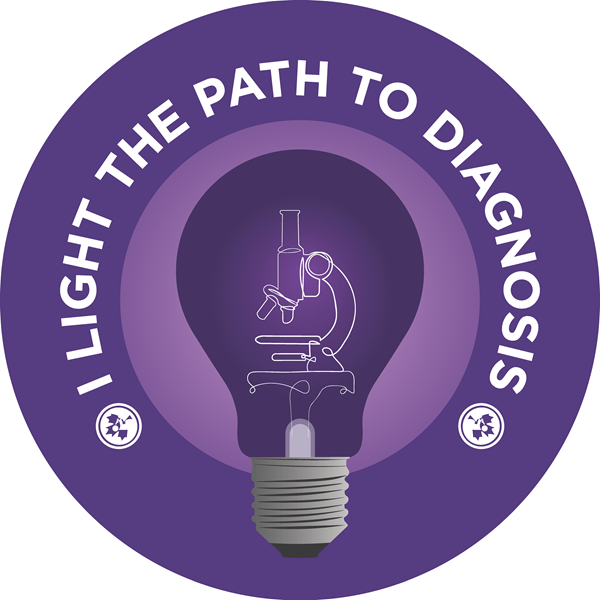
Make your message stick! Download and print fun, full-colour Lab Week stickers.
(Stickers are sized to print standard Avery 22807 labels)

Start the conversation! Stat cards are a great way to show the public how medical laboratory science is a vital part of the health care system. Download, print, or include them in a display.

Share your Lab Week pride by customizing your social media profile pictures with this frame.

Make it fun! Challenge yourself or others by downloading and printing a med lab word search puzzle.

Educate others about what you do! Share medlabprofessionals.ca website with your friends and family to give them an understanding of what happens in the lab and who you are as a medical laboratory professional.

Sign it with pride! Help spread the word about National Medical Laboratory Week with every email.
(To set up in Outlook, simply open "New email" and click on "Signature." Copy and paste the email signature template in the "Edit Signature" space provided.)
© 2025 - CSMLS-SCSLM - All Rights Reserved
Connect With Us
Facebook
Twitter
Communities
YouTube
eNews
LabBuzz
LABCON
Medlab professionals
Alternate Careers
MentalHealth Toolkit